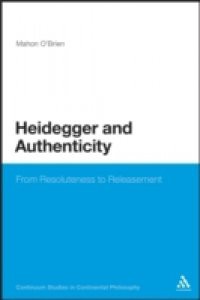Heidegger's thinking in the decades following the publication of Being and Time is often deemed irreconcilable with that work. Critics contrast the notion of "resoluteness" in Being and Time with Heidegger's post-war account of "releasement" in an attempt to establish a discrepancy between the allegedly voluntarist humanism of his early work and the supposedly 'anti-humanist' thinking of his later work. By contrast, Mahon O'Brien argues for the structural and thematic coherence of Heidegger's movement from authenticity to the search for an authentic free relation to the world - as captured by the term "releasement". By demonstrating the structural and thematic unity of Heidegger's thought in its entirety, O'Brien paves the way for a more measured and philosophically grounded understanding of the issues at stake in the Heidegger controversy.

